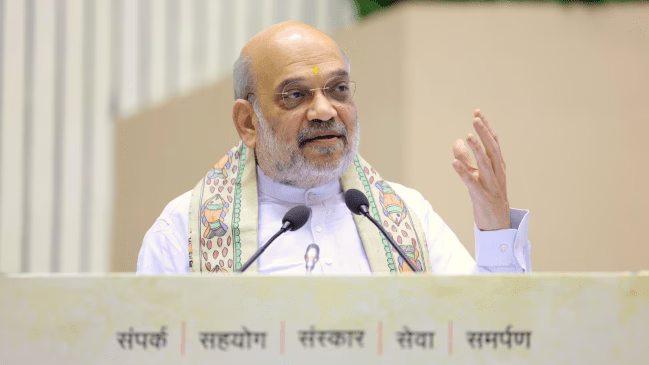



The Union Home Minister has introduced the National Cooperative Policy 2025 to enhance the sector's capacity and align with national development goals. The policy aims to expand cooperatives, promote education, and establish National Cooperative Exports Limited. It also addresses regional imbalances, lack of professional management, political interference, financial weaknesses, and low member participation.

Copyright infringement not intended
Picture Courtesy: INDIAN EXPRESS
The Union Home Minister introduces National Cooperative Policy 2025, to strengthen the sector's institutional capacity, expand its reach, and align with national development goals.
A Cooperative Society is an association of individuals united voluntarily to meet their common economic, social, and cultural Interests.
Cooperatives first received official recognition with the Cooperative Credit Societies Act of 1904, before this, many informal cooperative practices existed, but this act gave them legal standing.
The main vision for cooperative sector is "Sahakar se Samriddhi," which means "Prosperity through Cooperation", to bring economic growth, "inclusive growth" and "rural development."
|
Success story of Amul Amul started as a small cooperative movement by dairy farmers in Gujarat and grew into a massive brand for milk and dairy products. It showed how small farmers, when united, could challenge bigger companies and improve their own lives. Amul became a model for cooperative success in India and worldwide. |
After India gained independence, the government supported cooperatives by integrating them into its Five Year Plans.
The National Cooperative Policy and the Multi-State Cooperative Societies (MSCS) Act in 2002 aimed to provide a framework for the growth and development of cooperatives, promoting their autonomy and democratic functioning.
Cooperatives received a Constitutional status with the 97th Constitutional Amendment in 2011.
The Agriculture Ministry was responsible for the cooperatives department since 1979. In 2021, the government established a separate Ministry of Cooperation to manage policies, initiatives, and support for cooperatives nationwide.
Multi-State Cooperative Societies (Amendment) Act, 2023 => Improve the management of multi-state cooperatives, make them more transparent, and prevent issues like corruption.
|
Sector / Activity |
Cooperative's Share |
Impact |
|
Agricultural Credit |
20% |
Provides loans to farmers, helping them purchase seeds, fertilizers, and equipment. |
|
Fertilizer Distribution |
35% |
Ensures farmers get necessary fertilizers at fair prices, boosting agricultural productivity. Cooperatives also handle 25% of fertilizer production. |
|
Sugar Production |
31% |
Cooperatives are major players in the sugar industry, providing a stable income source for sugarcane farmers. |
|
Milk Production |
10%+ |
Cooperatives like Amul manage over 10% of India's milk procurement and processing, empowering dairy farmers. |
|
Wheat & Paddy Procurement |
13%+ (Wheat), 20%+ (Paddy) |
Help farmers sell their produce at Minimum Support Prices (MSP), ensuring fair returns and contributing to national food reserves. |
|
Fishermen's Business |
21%+ |
Supports fishermen by providing resources, market access, and processing facilities, improving their economic well-being. |
|
Overall Reach |
Data highlights the massive socio-economic impact of cooperatives, reaching a significant portion of India's population through various societies (e.g., credit, marketing, housing, consumer). |
The new policy's key objectives are to strengthen, expand, and diversify cooperatives.
Strengthening and Deepening Grassroots => Establish 2 lakh new multipurpose Primary Agricultural Credit Societies (M-PACS), Dairy, Fishery Cooperative Societies covering all the Panchayats/ villages in five years,
Diversification of PACS -> Focuses on inclusive growth and employment, empowering rural populations, and diversifying cooperatives into over 25 sectors.
Promotes cooperative education through Tribhuvan Sahkari University, India's first national cooperative university.
Establishes National Cooperative Exports Limited (NCEL) to help cooperative societies export their products to other countries, to boost farmers' income and contribute to national exports.
Empower rural populations, focusing on Dalits, Adivasis, women, and youth, and strengthen their economic role.
Regional Imbalances => Some states, like Gujarat and Maharashtra, have very strong cooperative movements, while others, like Uttar Pradesh and Bihar, are less developed. This leads to regional disparity in economic benefits.
Lack of Professional Management => Many cooperatives lack skilled managers and modern business practices, which affects their efficiency and growth.
Political Interference => Sometimes, political leaders try to control cooperatives for their own benefit, which can harm the democratic functioning and financial health of these organizations.
Financial Weakness => Many cooperatives struggle with limited funds, poor recovery of loans, and lack of access to modern banking facilities.
Low Member Participation => In some cooperatives, members do not actively participate in decision-making, which leads to a disconnect between the management and the members.
Focused Expansion => Promoting and establishing new cooperatives in underserved states like Uttar Pradesh and Bihar to reduce regional imbalances.
Capacity Building & Training => Providing professional training to cooperative managers and members. Institutions like the Institute of Rural Management Anand (IRMA) are contributing to this by training rural managers, this need to expand.
Digitalization & Technology Adoption => Using technology for better record-keeping, financial management, and market access.
Robust Governance & Regulatory Framework => Implementing strict rules and laws to ensure transparency, accountability, better auditing and supervision, and ethical functioning of cooperatives.
Promoting Youth & Women Participation => Bring fresh perspectives and energy to the movement
Must Read Articles:
Source: INDIAN EXPRESS
|
PRACTICE QUESTION Q. Discuss the challenges that need to be addressed for the successful implementation of the National Cooperative Policy. (250 words, 15 marks) |
The core idea is 'each for all and all for each,' where people voluntarily join to achieve common economic, social, and cultural needs through a jointly-owned and democratically-controlled enterprise.
The cooperative sector significantly contributes by providing 20% of agricultural credit, distributing 35% of fertilizers, and contributing to sugar, milk, wheat, paddy, and fisheries production, thereby supporting millions of livelihoods.
The 97th Constitutional Amendment granted constitutional status and protection to cooperative societies, reinforcing their autonomy and democratic functioning.






© 2026 iasgyan. All right reserved